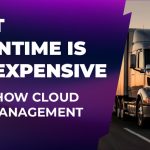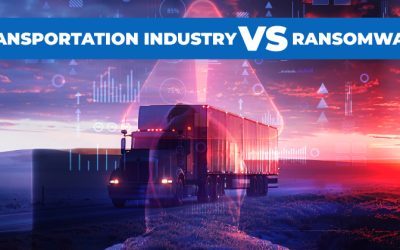
Ransomware is something you too often hear about on the news. Or maybe something your computer-savvy fishing buddy has brought up. A survey by IDC revealed that 37% of global organizations had been victims of a ransomware attack in 2021. However, you might be a bit dismissive because you cannot imagine a ransomware attack ever happening to your freight business.
Let me tell you right now, a trucking company or any business for that matter should NEVER assume they are too small or not significant enough to be targeted by ransomware attack. Small businesses, especially, are typically easy targets because they often do not have the business ransomware protection or the resources to implement comprehensive security protocols. Because of this, it makes them far more vulnerable and easier to attack.
In addition, there are far more small businesses to attack than large ones. Smaller companies are, in fact, a prime target. Not to mention, whether you realize it or not, trying to recover from ransomware can be challenging! Trust me; we have had to help clients in the past.
So, what exactly is Ransomware?
Trend Micro tells us that Ransomware is a type of malware that prevents or limits users from accessing their system, either by locking the system’s screen or locking the users’ files until a ransom is paid. More modern ransomware families, collectively categorized as crypto-ransomware, encrypt certain file types on infected systems and force users to pay the ransom through specific online payment methods to get a decryption key.
Ransom Prices and Payment
Ransom recovery prices vary depending on the ransomware variant and digital currencies’ price or exchange rates. Because of the cryptocurrencies’ perceived anonymity, ransomware operators often demand bitcoins as ransom payments. Alternative payment options such as iTunes and Amazon gift cards are also being used by recent ransomware variants. Among 95% of ransomware-related losses, Verizon reported a median loss of $11,150. Losses, however, ranged from $70.00 to $1,250,000. It should be noted that paying the ransom does not guarantee that users will get the decryption key or unlock tool required to regain access to the infected system or files being held hostage.
The following is from Transport Topics.
Titan Transfer is one trucking company that has experienced the impact of ransomware firsthand. According to Tommy Hodges, the company’s chairperson, it’s been hacked twice during the past year, resulting in “total disruption” of Titan’s day-to-day operations.
Titan was luckier than most. Hodges said those files were rebuilt in four days, adding that it was a nightmare going without computers for four days.
The Sophos study found that criminals behind successful ransomware attacks often break promises to restore files once the ransom was paid. On average, victimized organizations in the study that paid ransoms only got back 65% of their data. According to the study, only 8% of organizations forking over money to the extorters could retrieve all of their files.
Source: Transport Topics
Ransomware protection for fleets
This year’s successful ransomware attacks have proven so visceral that President Joe Biden nudged U.S. companies to take ransomware protection seriously by issuing an executive order. With the threat of ransom attack expected to reach new heights in 2022, many trucking and logistics companies are doubling down on their defenses against the scourge to ensure they have done everything they can to avoid becoming its next victim. Here are a few things you can do to guard against ransomware from CISA.Gov (Cybersecurity & Infrastructure Security Agency):
- Identify assets that are searchable via online tools and take steps to reduce that exposure
- Protecting Against Ransomware
- Good Security Habits
- Understanding Anti-Virus Software
- Understanding Patches and Software Updates
- Using Caution with Email Attachments
- Choosing and Protecting Passwords
- SMB Security Best Practices
- Website Security
- Operational technology assets are vulnerable to rising ransomware.
How do we protect your data?
With TMS Digital, you can rest assured that you are both protected and secure! The TMS Digital system’s data resides and is hosted on our parent company, Protected Harbor’s, data servers.
Cyber security is critical to us, and our ransomware attack protection uses several tools to assure that your data is safe and secure from ransomware, phishing, viruses, and malware:
- Antivirus – Windows Defender
- Backup Solution – System Center Data Protection Manager
- DDoS\Malicious Network Activity – Elastic Search
- Proactive Monitoring – PRTG
- Geo-IP Filtering – pfBlockerNG
Ransomware Impacts and Preventions for Transportation
The critical element of a cybersecurity strategy is using a layered approach, such as you see listed above. Plans will include putting the systems preventative measures in place, stopping an attack in progress, recovery after a cyberattack, and strategies for Insurance and the aftermath.
REPORT AN INCIDENT
Victims of ransomware attacks should report to federal law enforcement via IC3 or a Secret Service Field Office and request technical assistance or provide information to help others by contacting CISA.
Better yet, be safe, and stay safe with TMS Digital Transportation Management Software! Our TMS Dispatch program offers customization to fit your company’s needs. Our Ticket system is easy to use for short-haul dispatch or for a dump truck business. Both systems have built-in Billing and Settlements and interface with most leading accounting packages.
We also offer an IFTA Manager application for calculating your IFTA taxes! But best of all, these applications and our other TMS programs are all hosted on SECURE servers! Contact us today!





